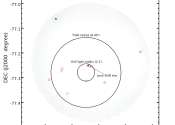Small-scale challenges to the cold dark matter model
(Phys.org)—A collaborative of researchers from several U.S. universities has published a new paper that explains the major contradictions presented by the prevailing cold dark matter (CDM) cosmological model, and proposes ...









